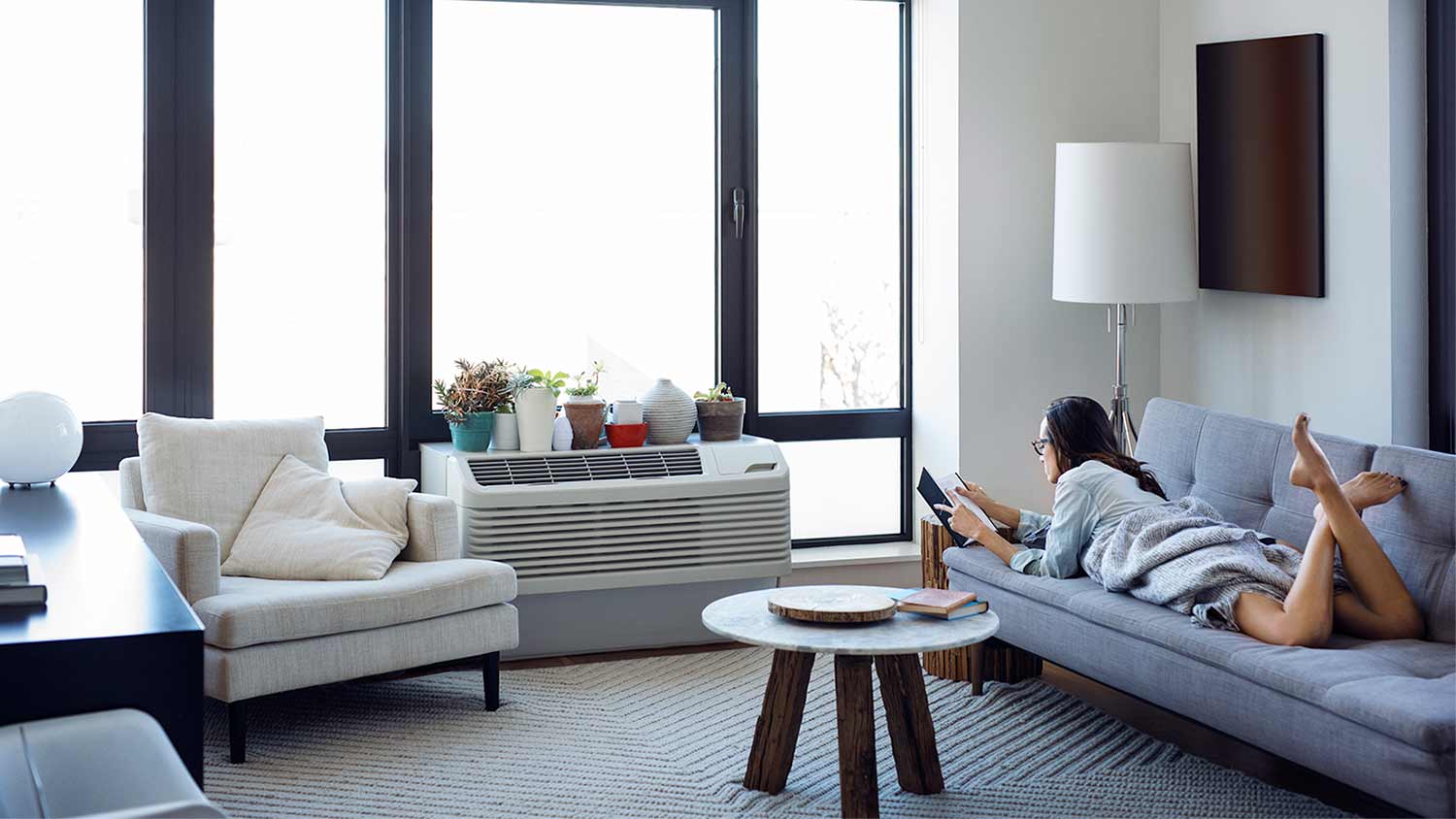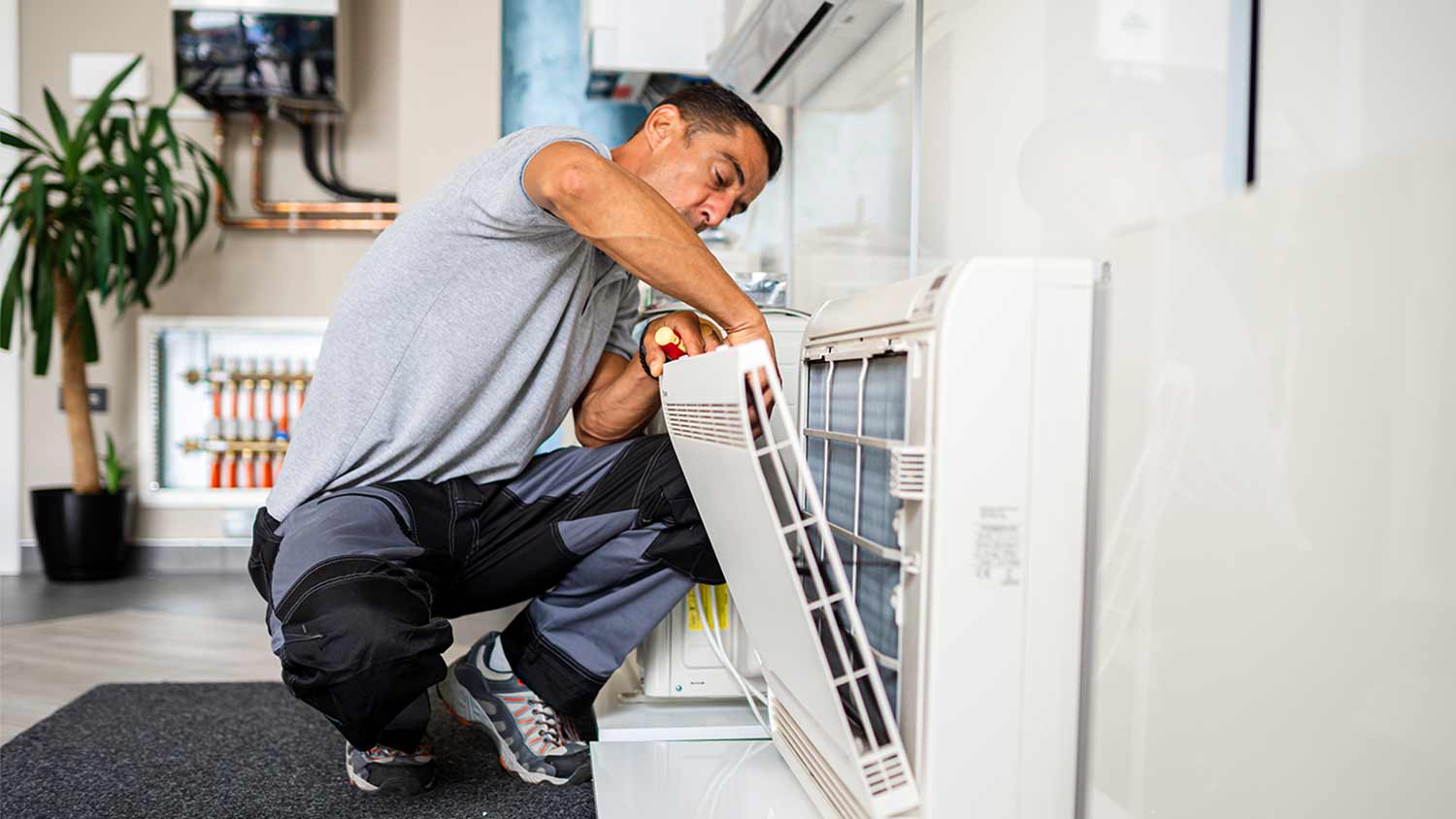Heat Pump vs. Air Conditioner: What’s the Difference?
This battle is gonna get heated


Air conditioners and heat pumps both cool your home efficiently.
Heat pumps can also heat your home, unlike air conditioners.
Heat pumps can be more energy efficient compared to their AC counterparts.
Air conditioners are better suited for homes in more extreme climates.
Whether you live in a year-round warm climate or somewhere with four distinct seasons, chances are you want to cool down when the temperature rises. When looking at options to cool your home, you might be weighing the pros and cons of heat pumps versus air conditioners.
Whether you’re interested in upgrading your current system or replacing a broken unit, we have a complete guide to help you learn the differences between these two systems and make the best decision for your home.
Heat Pump vs. Air Conditioner: Key Differences
The main difference between a heat pump and an air conditioner is that a heat pump can cool and heat air, while an AC can only cool air. For this reason, air conditioners must be paired with another system (usually a furnace) to heat your home during the winter months. Heat pumps tend to be more energy-efficient and easy to maintain. On the other hand, air conditioners require a bit more maintenance and a separate heating system, but they often provide better cooling for extreme temperatures.
What Is a Heat Pump?

A heat pump is one type of HVAC system you can install to cool the air in your home. This system pumps the warm air from inside your home to the outside. Unlike an air conditioner—which pulls warm air and pumps cool air back into your home after cooling it—a heat pump sucks the heat out of your home completely, leaving just the cooler air behind.
Besides cooling down your home, a heat pump can also warm your home, giving it a dual purpose.
| Pros | Cons |
|---|---|
| Energy-efficient | Reliant on electricity |
| Easy to maintain | Shorter lifespan with year-round use |
| Even heat and air distribution | Not as energy-efficient depending on usage |
Best for:
Homeowners who may want to swap systems in the future
Those who want low-maintenance heating and cooling system
Those looking for an energy-efficient system
Pros of a Heat Pump
A few outstanding features of a heat pump make it an excellent choice for heating and cooling your home.
Most heat pumps use electricity, making it easy to swap systems in the future.
You can also find heat pumps that run off of natural gas, propane, or a heated water system.
Heat pumps distribute heat and cool air evenly throughout the home by using your ductwork.
They’re energy-efficient due to how they pull heat out of your home.
Heat pumps are relatively easy to maintain and typically only need maintenance twice a year.
Cons of a Heat Pump
When comparing a heat pump versus an AC, it’s important to consider some things that might not make it the best option for your home.
Because a heat pump works off electricity, you’ll be without cool or hot air if the power goes out.
Since one system controls your home's heating and cooling, you’ll be without both if it breaks.
Heat pumps don’t last as long if you’re running them all year versus seasonally.
They aren’t as energy-efficient if you’re running the auxiliary heat often.
What Is an Air Conditioner?

An air conditioner is another type of HVAC system you can install in your home to cool things down during warmer temperatures. While many might think that air conditioners simply push cold air into the house, they actually take the warm air from inside, cool it down, and re-pump it back into the house. An air conditioner’s only function is to cool down the warm air inside of a home; it cannot heat cool air. Instead, a home with an air conditioner typically has a furnace to heat the home during the colder months.
| Pros | Cons |
|---|---|
| Fast and efficient air distribution | Unable to heat your home |
| Ideal for large spaces | Requires a separate system to heat your home |
| Improves indoor air quality | Requires regular maintenance |
Best for:
Homes with a furnace
Those willing to invest time and money into regular maintenance
Those who need a system that filters impurities and improves air quality
Pros of an Air Conditioner
There are several advantages to cooling your home with an air conditioner.
It’s a fast and effective way to beat the summer heat.
An air conditioner’s design is solely for keeping your home cool—a job it’s really good at—unlike a heat pump with two functions (heating and cooling).
AC distributes cool air throughout your home efficiently by using your home’s ductwork.
You can also filter out impurities in your home’s air and improve indoor air quality with an air filter.
Air conditioners efficiently and quickly cool down large spaces.
Cons of an Air Conditioner
While air conditioners have many advantages when trying to cool your home, there are some disadvantages you need to be aware of.
Even though an AC can cool your home well, it cannot also heat your home (unlike heat pumps).
You must pair an air conditioner with a furnace to warm your home, meaning you must have space (and finances) for both units.
AC can also be expensive to operate due to the amount of electricity used, especially if you live in a warmer climate.
You’ll need to have the filter changed or cleaned regularly to maintain clean air circulation.
It can make the air in your home dry, leading to dry skin.
Heat Pumps vs. Air Conditioners

When considering a heat pump vs. AC, there are a few major (and minor) things to consider. Since this is a relatively long-term investment, weighing the pros and cons is essential when determining which is best for you and your home.
Cost: Heat Pump
Both heat pumps and air conditioners can vary greatly in price. The cost of a heat pump ranges from $4,200 to $7,600 for professional installation from a local heat pump installer. Factors like capacity, efficiency rating, labor, and type of heat pump all play into what you will pay for installation. Because this unit can both heat and cool your home, you’ll only be paying one price for both functions, so these will typically cost more than an AC unit.
Beyond the initial cost of the units, it’s also important to consider how much it’ll cost to operate your system. Generally, running your heat pump to cool your home is more cost-effective as the workload is less than that of an air conditioner. However, if you need to run your heat pump’s internal heater to warm your home, you can expect to pay a bit more during those times.
Depending on your thermostat settings and how frequently you’re running your AC, you could have a variable bill. Air conditioners tend to use a good amount of electricity, and you should remember to include the cost of running your furnace in the overall cost. So a heat pump can be more cost-effective to install, but an AC might be less costly to run in certain climates.
Energy Efficiency: Heat Pump
If you live in a warmer climate, a heat pump will probably be the more energy-efficient choice for you.
One way to know how much energy your unit will use is by checking the SEER rating. Both heat pumps and air conditioners have SEER ratings, which mean the following:
A rating of 21 or over means your unit is the most energy efficient, but these are usually the most expensive.
Units with a SEER rating between 15 and 20 are considered mid-range energy efficient, and most individuals’ homes will do just fine with something in this range.
The least effective SEER ratings are 13 and 14. These units typically cost less to buy upfront but are more expensive to run.
Length of Life: Tie
Because of the cost, you’ll want to ensure that whatever you’re buying will last a considerable time. Heat pumps work great in temperatures as low as 30 degrees Fahrenheit. Anything below freezing could cause ice to build up on the outdoor unit coils, even though heat pumps have a defrost system. Ice on these coils can lead to issues, such as refrigerant leaks and broken fan blades, that require repairs.
Heat pumps typically last about 15 years, which can change depending on your location. In climates where you're not running the heat pump too often, or if you live in a warmer climate where the heat function doesn’t turn on often, you can get up to 25 years out of your unit before replacing it. If you live where you experience colder temperatures more frequently and must turn your unit to heat, you can expect a life span closer to 10 years.
Air conditioners are more durable, even in very warm temperatures. However, remember not to run your AC when it's lower than 60 degrees outside, as you could cause issues that will require repairs, such as bearing damage and lubrication thickening. Air conditioner life spans can also depend on your location; like with most things, the more you use your system, the quicker you’ll need to replace it. Most air conditioners have a lifespan of 15 to 20 years.
Maintenance: Tie

Regular maintenance for heat pumps and air conditioners is crucial for longevity, especially since they can be expensive.
Heat pump maintenance is needed one to two times a year, depending on whether you use it year-round or only part-time. Similarly, you’ll need a service for your AC twice a year. A good cleaning schedule is in spring and fall. This will make it easy for your systems to work to the best of their ability, and for air conditioners, the fall cleaning will prepare them for winter when they most likely will not be used.
Heat pump repair costs are between $160 and $640, depending on the extent of the damage. Similarly, air conditioner repair can cost between $100 and $2,000.





- Furnace Repair
- Air Conditioning Repair
- HVAC Repairs
- Furnace Installation
- Wood & Pellet Stove Repair
- Dehumidifier & Humidifier Repair
- Heat Pump Companies
- Swamp Cooler Repair
- Wood Stove Services
- HVAC Companies
- Commercial A/C Repair
- Geothermal Installation
- Air Conditioning Installation
- Boiler Repair
- 24 Hour Furnace Repair
- Geothermal Repair
- Heat Pump Repair
- Humidifier Installation
- Thermostat Repair
- Thermostat Installation
- Nest Installation
- Heating & Cooling
- Heating Repair
- Furnace Cleaning
- Furnace Tune-Up
- HVAC Technicians
- Subcontractors
- Furnace Maintenance
- Plumbing & Heating Companies
- Wood Stove Inspection
- Mini Split Installation
- Wall Heater Repair
- Duct Installers
- Is a Heat Pump Worth It? Pros, Cons, and Alternatives
- What Is a Heat Pump and How Does It Work?
- Do Heat Pumps Heat and Cool?
- 9 Types of Air Conditioners: Pros, Cons, and How to Choose
- Heat Pump Not Blowing Hot Air? 7 Issues That May Be the Culprit
- What Size Heat Pump Do I Need? How to Calculate the Right Size
- Do Air Conditioners Use Water? They Don’t, So Here’s What That Puddle Is
- 8 Common Problems With Geothermal Heat Pumps
- The Best Time to Buy an Air Conditioner
- Breathe Easy: 10 Tips for Improving Your Indoor Air Quality










